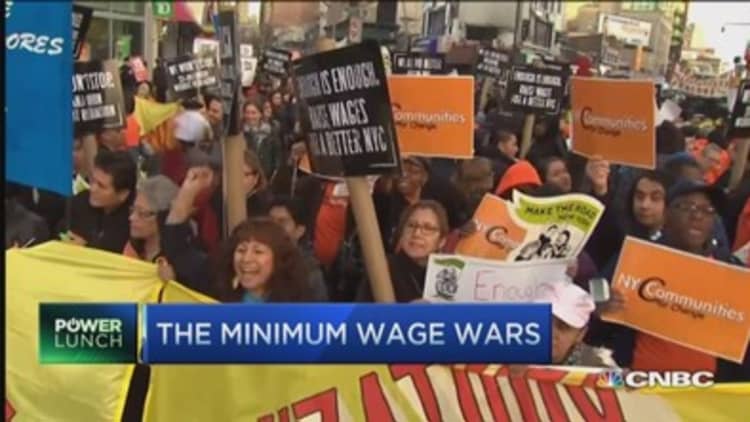I really need people to know how hard we work.Carlos JeffersonMcDonald's worker in Wisconsin
McDonald's recent efforts to boost wages at company-operated restaurants appears to be backfiring, as frustrated employees at franchise-operated locations—who were passed over for a pay raise—are pushing back. McDonald's employees were among hundreds of fast food workers who were protesting on Tax Day and pushing for a national minimum wage of $15 an hour.
Earlier this month, the fast food giant announced it would boost pay at its company-owned U.S. restaurants—about 90,000 workers or roughly 10 percent of its locations nationwide, The raise, which will begin in July, will not affect its more than 3,100 McDonald's franchisees across the country that operate individual businesses and make their own decisions on pay and benefits.
McDonald's grill operator and single dad Carlos Jefferson said excluding franchise-operated restaurants from the pay raise was a wrong move.
"We're doing just as much as corporate McDonald's" restaurants, said Jefferson, who works at a franchise-operated location in Milwaukee. "We deserve a raise just as much as franchised McDonald's," said the 30-year-old. (Tweet This)
Jefferson—the father of a 1-year-old—earns $7.25 an hour, and was among hundreds of fast food workers in dozens of U.S. cities who are mobilizing for a federal minimum wage of $15. The rate nationally now stands at $7.25 an hour. The protests included low-wage employees who work in home care, child care, airports, retail and as adjunct professors.
Protest organizers chose Tax Day April 15 because the date includes "15," reflecting the fight for $15 an hour.
Read MoreMcDonald's to raise pay as franchises may feel new pressure
Beginning in July, McDonald's will raise the minimum wage by $1 over the locally mandated minimum pay for its corporate-owned locations. The company estimates the hourly average will be above $10 by the end of 2016.
"This is an initial step for our U.S. business. I understand that some may believe it doesn't go far enough," McDonald's CEO Steve Easterbrook wrote in an April 1 op-ed in the Chicago Tribune. "These actions demonstrate meaningful progress, and it is what we can do right now in our company-owned stores."
Those calling for higher minimum wages argue incremental, selective pay raises are not enough.
A recent report from the National Employment Law Project shows nearly half—42 percent—of workers in America are paid less than $15 an hour.
"Low-wage occupations in sectors such as retail, home care and restaurants are among the fastest growing in the country," said Christine Owens, executive director of the National Employment Law Project. "If we want an economy that is balanced and shares prosperity fairly, we must raise wages in these sectors so that they can serve as the cornerstones to rebuilding our nation's disappearing middle class," she said in a prepared statement.

Added Jefferson of Milwaukee: "I really need people to know how hard we work."
The McDonald's announcement follows other big employers that have raised starting wages amid a tightening job market. Companies recently boosting pay include Target, Wal-Mart, T.J. Maxx and Gap among others.
Read MoreSome McDonald's franchisees not lovin' it
—With additional reporting by CNBC's John Schoen


